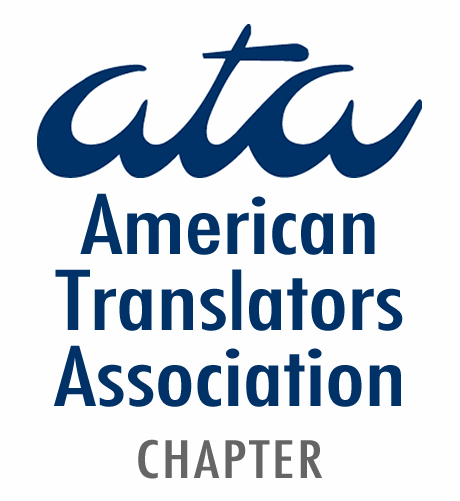![]() Women in Translation Month (#WIT) has come and gone, but we at NOTIS believe that women, transgender women, and non-binary authors and translators should be celebrated not only throughout the course of one month, but all year round.
Women in Translation Month (#WIT) has come and gone, but we at NOTIS believe that women, transgender women, and non-binary authors and translators should be celebrated not only throughout the course of one month, but all year round.
As you may well know, painfully few books published and sold in the United States are translations (approximately 3%). And of those translated texts, only about 30% are written by women.
These numbers are dismal––yes––and we must absolutely continue working towards a more equitable future for women in translation.
That said, the purpose of today’s post is celebratory!
Did you know that the current Board of Directors at NOTIS is made up entirely of powerful and talented women linguists? Theirs are the faces of translation and interpreting, and working with them is truly inspirational.
Read NOTIS board member bios here
One of our organization’s primary objectives is to highlight and amplify historically underrepresented voices. To that end––and in late (but never too late) observance of #WIT month––we have spoken with a few local translators about their current projects.
Without further delay, I will now yield the floor to Mia Spangenberg, Shelley Fairweather-Vega, and Takami Nieda so that they may tell you, in their own words, about the women they are translating.
Mia Spangenberg

Mia Spangenberg holds a Ph.D. in Scandinavian Studies from the University of Washington with a focus on Finnish literature and cultural studies. She translates fiction, nonfiction, and children's literature from Finnish and German into English.
Here’s what Mia has to say about her experience translating Small Crescendos, a genre-bending work of autofiction by Finnish author Pirkko Saisio:
Pirkko Saisio is a giant on the Finnish cultural scene, and I have long admired her both for her novels and plays. Her prose is unique: an autofictive, genre-bending style that incorporates elements from theatre, poetry, and postmodern aesthetics. I love her visual focus on objects and the setting, as well as her rhythm and pacing and how it moves her narratives forward. Translating anything she writes is always a challenge, but it is also always a joy. Someone told me that you can tell when a translator truly loves the work they are translating, and I guess I am doing something right because I received the best compliment from Saisio herself - she told me she was moved by my translation and how I had perfectly captured the rhythm. It's wonderful to have this connection with her, and I hope to make more of her work available in English soon!
- Read Mia’s translation of “Small Crescendos” here (published by Asymptote) to get a sense of that perfect rhythm!
- Read more about Mia's work here
Shelley Fairweather-Vega

Shelley Fairweather-Vega translates from Uzbek and Russian into English, specializing in texts concerning culture, history and politics. For six years, she has been an active member of NOTIS’s Board of Directors and she currently serves as its president. Shelley is also a member of the Advisory Board at the University of Washington’s Translation Studies Hub.
Here's what Shelley has to say about the upcoming anthology of Kazakh women's literature she's collaborating on:
This month my colleague Zaure Batayeva and I got the news that our anthology of Kazakhstani women's writing, Amanat, will be published by Gaudy Boy in July 2022 - just in time for next year's Women In Translation month. We've been translating these short prose pieces since 2017, with our first three translations appearing in Words Without Borders in 2018. Kazakhstan is a big and complicated country from which we have very little literature in English. As a former Soviet republic, it's home to people writing in both Kazakh (a Turkic language with a long oral tradition) and Russian (a Slavic language with a storied literary tradition). In the old Soviet writing bureaucracy, male writers occupied most positions of authority, and they won the bulk of the funding and publication contracts. While the Soviet system is gone, some of its institutions remain, and male authors still receive more than their share of attention in English translation. That was part of what motivated us to focus on female authors. They are telling their own stories and the story of their country, and doing so with very little institutional support. Women in Kazakhstan are also helping to bridge the gap between the two languages spoken there and their associated cultures. I was surprised to learn that at least half of the twelve authors in our collection are translators themselves, either between Kazakh and Russian, or between those languages and others. That makes it a special honor to work with them. Even the way Zaure and I have divided up our labor on this collection reflects the linguistic diversity in Kazakh literature today - she is in charge of author relations and translated the Kazakh-language stories, while I am in charge of publisher relations and translated the Russian-language stories; I answered her questions about the English language, and she answered my questions about Kazakhstani culture. So our small team of female translators will, I hope, bring this larger team of female writers, from a country we need to know more about, to the attention of a wider audience.
- Read more about Shelley and her translation work here
Takami Nieda

Takami Nieda was born in New York City and has degrees in English from Stanford University and Georgetown University. She has translated more than ten works from Japanese into English and has received numerous grants and residencies in support of her translations, including the PEN/Heim Translation Fund. Formerly an assistant professor of translation at Sophia University in Tokyo, Japan, Nieda currently teaches writing and translation at Seattle Central College in Washington State.
Here’s Takami on her experience translatingThe Color of the Sky is the Shape of the Heartby Chesil:
The story is about Ginny Park, a teen in search of belonging. As a Zainichi Korean born and raised in Japan, she isn’t fully accepted at Japanese school because she’s Korean, and isn’t fully accepted at Korean school because she’s not Korean enough. This sense of in-betweenness, by the way, is something that I’m certain many readers can identify with. Ginny can’t fit in. She won’t fit in, and her wild tongue gets her into more trouble than out against her bullies. Furthermore, when she sees an injustice, she’s fearless enough to say, “This is wrong” even when others wish she wouldn’t, and when she commits a certain act of defiance, she is forced to leave her native Japan. Bouncing around from Japan to Hawaii to Oregon, Ginny is looking for that one thing everyone wants—a community that will accept her just the way she is.
I fell in love with Ginny for her righteous anger and courage to call something out when it’s wrong, especially since this isn’t particularly encouraged in Japanese society. I was also heart-stricken by how Ginny has to navigate the complexities of discrimination and injustice all alone, without anyone to help her or to validate her anger. I thought the novel wasn’t merely a story directed at young readers but was also calling out adults for creating a society that is fraught for young girls like Ginny. In doing a bit more research about the author Chesil, I found an article where she mentioned how growing up, she disliked hearing a certain catch-all excuse that grownups used to avoid involvement or to ignore the plight of others: “It doesn’t concern me.” The novel is, in part, a response to those grownups. Reading this gave me the sense that I had connected with the novel in the way the writer had intended, and also gave me the confidence to ask permission to translate the book. Chesil very graciously said yes.
Every aspect of translating the book was challenging and delightful, and I especially enjoyed being able to consult Chesil during the translation and editorial process. She very generously answered every question I sent her, giving me insight into her intentions and process. By combing through the details of the novel with her, I came to learn how deeply personal this story is to her, and fell in love with Ginny even more. I’m excited for English readers to get to know Ginny through her journey.
- Follow Takami on Twitter @TNieda to stay informed about her recent translation work, teachings, etcétera
Thank you for joining us in celebrating and amplifying the voices of women in (and of) translation, not just in August but year-round.
If you would like NOTIS to feature a publication of yours in a future blog post or via social media, please contact Brianna Salinas.
Further reading

 12819 SE 38th St. #205,
12819 SE 38th St. #205, 